| Listing 1 - 10 of 13 | << page >> |
Sort by
|
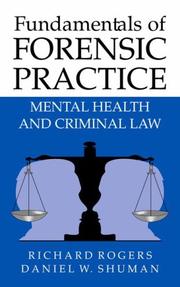
ISBN: 1280608242 9786610608249 0387252274 0387252266 144193779X Year: 2005 Publisher: New York : Springer,
Abstract | Keywords | Export | Availability | Bookmark
 Loading...
Loading...Choose an application
- Reference Manager
- EndNote
- RefWorks (Direct export to RefWorks)
Forensic psychologists and psychiatrists are increasingly asked to provide expertise to courts and attorneys in the criminal justice system. To do so effectively, they must stay abreast of important advances in the understanding of legal standards as well as new developments in sophisticated measures and the methods for their assessment. Fundamentals of Forensic Practice is designed to address the critical issues that are faced by mental health experts in their role of conducting assessments, presenting findings, and preparing for challenges to admissibility and credibility. Uniquely practical and comprehensive, this volume operationalizes legal standards and describes empirically validated methods for their evaluation. Not only is this essential for mental health professionals, but it is equally valuable to criminal attorneys. Lawyers require both clinical knowledge and understanding of legal standards in order to prepare their own experts and to challenge those on the opposing side. For both clinical and legal experts Fundamentals of Forensic Practice offers a full view of all phases of criminal proceedings: - Pretrial—diversion, determinations of bail, waivers of Miranda rights, and the capacity to consent to searches. - Trial—competency to stand trial and criminal responsibility. Beyond insanity, the latter addresses mens rea, automatism, and psychological context evidence, such as battered-woman syndrome. - Post-trial—sentencing, capital sentencing, competency to be executed, and other post-conviction issues. Other key features include: - Chapters on specific criminal issues in a consistent format, with comprehensive coverage of legal standards and relevant clinical methods - Guidelines for conducting more effective forensic evaluations - In-depth coverage of specialized assessments, eg. malingering, sexual predator cases, and the insanity defense. - A detailed overview of direct and cross-examination strategies This book is the second collaboration between Rogers and Shuman. As individual authors, each received the American Psychiatric Association’s prestigious Guttmacher Award for their outstanding contributions to forensic psychiatry.
Evidence, Expert --- Forensic psychiatry --- Criminal procedure --- Insanity (Law) --- Law --- Law and Psychology. --- Psychological aspects. --- Juridical psychology --- Juristic psychology --- Legal psychology --- Psychology, Juridical --- Psychology, Juristic --- Psychology, Legal --- Psychology, Applied --- Therapeutic jurisprudence --- Psychology --- Psychology. --- Behavioral sciences --- Mental philosophy --- Mind --- Science, Mental --- Human biology --- Philosophy --- Soul --- Mental health
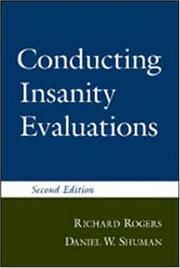
ISBN: 1572305215 Year: 2000 Publisher: New York (N.Y.): Guilford
Abstract | Keywords | Export | Availability | Bookmark
 Loading...
Loading...Choose an application
- Reference Manager
- EndNote
- RefWorks (Direct export to RefWorks)
#PBIB:2002.1 --- Forensic psychiatry. --- Insanity defense. --- Mental illness --- Insanity Defense --- Expert Testimony --- Forensic Psychiatry --- Interview, Psychological --- Diagnosis. --- methods --- Forensic psychiatry --- Insanity defense --- Psychiatric diagnosis --- Psychodiagnostics --- Defense (Criminal procedure) --- Insanity (Law) --- Medical jurisprudence --- Psychiatry --- Mentally ill offenders --- Diagnosis --- Law and legislation --- Methods
Digital
ISBN: 9780387252278 Year: 2005 Publisher: Boston, MA Springer Science+Business Media, Inc
Abstract | Keywords | Export | Availability | Bookmark
 Loading...
Loading...Choose an application
- Reference Manager
- EndNote
- RefWorks (Direct export to RefWorks)
Psychology and law --- psychologie --- recht --- GGZ (geestelijke gezondheidszorg)
Book
ISBN: 1489982841 1441901515 9786612292255 1282292250 1441901523 Year: 2009 Publisher: New York ; London : Springer,
Abstract | Keywords | Export | Availability | Bookmark
 Loading...
Loading...Choose an application
- Reference Manager
- EndNote
- RefWorks (Direct export to RefWorks)
As many as one in four adults in the workforce will suffer from psychiatric illness in a given year. Such illness can have serious consequences -- job loss, lawsuits, workplace violence—yet the effects of mental health issues on job functioning are rarely covered in clinical training. In addition, clinicians are often asked to provide opinions on an employee’s fitness for work or an evaluation for disability benefits, only to find themselves embroiled in complex legal and administrative conflicts. A unique collaboration between a renowned clinical professor of psychiatry and a noted legal expert, Evaluating Mental Health Disability in the Workplace approaches the topic from two distinct areas: the legal context and issues relevant to disability and disability-related evaluations, and the interplay of factors in the relationship between work and psychiatric illness. From this dual perspective, the authors advocate for higher professional standards ensuring that employers, evaluees, or third parties are provided with the most reliable information. Key features of the book: A robust assessment model of psychological disability in the workplace Practice guidelines for conducting workplace mental health disability evaluations Legal and ethical aspects of employment evaluations, especially as they differ from clinical procedure Examination of the process of the development of psychiatric disability Issues specific to evaluations for Social Security, Workers’ Compensation, and other disability benefit programs Issues specific to evaluations for the Americans with Disabilities Act and Fitness-For-Duty evaluations Review of relevant administrative and case law As an introduction to these complex issues or for the further improvement of evaluation skills, Evaluating Mental Health Disability in the Workplace is a timely reference for psychiatrists, psychologists, forensic mental health specialists, and attorneys in this field.
Employees --Mental health --Evaluation. --- Employees --Mental health services --Evaluation. --- Industrial psychiatry. --- Work --Psychological aspects --Evaluation. --- Industrial psychiatry --- Employees --- Work --- Disabled Persons --- Employment --- Mental Health Services --- Disability Evaluation --- Occupational Health Services --- Mental Disorders --- Socioeconomic Factors --- Health Services --- Persons --- Behavioral Disciplines and Activities --- Psychiatry and Psychology --- Diagnostic Techniques and Procedures --- Community Health Services --- Human Activities --- Population Characteristics --- Health Care Facilities, Manpower, and Services --- Named Groups --- Anthropology, Education, Sociology and Social Phenomena --- Diagnosis --- Analytical, Diagnostic and Therapeutic Techniques and Equipment --- Health Care --- Clinical Psychology --- Industrial Medicine --- Medicine --- Psychiatry --- Health & Biological Sciences --- Mental health --- Evaluation --- Mental health services --- Psychological aspects --- Evaluation. --- Industry (Psychology) --- Method of work --- Work, Method of --- Industrial mental health --- Occupational psychiatry --- Laborers --- Personnel --- Workers --- Psychology. --- Personnel management. --- Psychiatry. --- Law. --- Clinical psychology. --- Clinical Psychology. --- Law, general. --- Human Resource Management. --- Medicine, Industrial --- Psychology, Industrial --- Industrial relations --- Personnel management --- Human behavior --- Labor --- Occupations --- Work-life balance --- Psychology, clinical. --- Corporations --- Employment management --- Human resource management --- Human resources management --- Manpower utilization --- Personnel administration --- Management --- Public administration --- Employment practices liability insurance --- Supervision of employees --- Acts, Legislative --- Enactments, Legislative --- Laws (Statutes) --- Legislative acts --- Legislative enactments --- Jurisprudence --- Legislation --- Medicine and psychology --- Psychology, Pathological --- Psychology, Applied --- Psychological tests
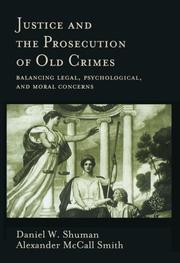
ISBN: 1557986932 Year: 2000 Publisher: [Place of publication not identified] American Psychological Association
Abstract | Keywords | Export | Availability | Bookmark
 Loading...
Loading...Choose an application
- Reference Manager
- EndNote
- RefWorks (Direct export to RefWorks)
Criminal law. --- Limitation of actions (Criminal law). --- Prosecution. --- Recovered memory. --- Victims of crimes --- Legal status, laws, etc. --- Criminal law --- Prosecution --- Limitation of actions (Criminal law) --- Recovered memory --- Law, General & Comparative --- Law, Politics & Government --- Legal status, laws, etc
Digital
ISBN: 9781441901521 Year: 2009 Publisher: New York, NY Springer-Verlag New York
Abstract | Keywords | Export | Availability | Bookmark
 Loading...
Loading...Choose an application
- Reference Manager
- EndNote
- RefWorks (Direct export to RefWorks)
Law --- Didactic strategies --- Psychiatry --- Personnel management --- psychiatrie --- recht --- coaching --- klinische psychologie --- GGZ (geestelijke gezondheidszorg)
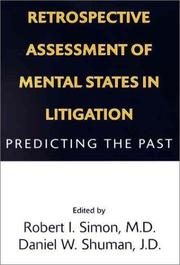
ISBN: 1585620017 Year: 2002 Publisher: Washington (D.C.) American psychiatric publ.
Abstract | Keywords | Export | Availability | Bookmark
 Loading...
Loading...Choose an application
- Reference Manager
- EndNote
- RefWorks (Direct export to RefWorks)
Forensic psychiatry --- Mental Competency --- Retrospective Studies --- Risk Assessment
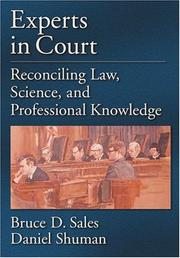
ISBN: 1591472466 Year: 2005 Publisher: [Place of publication not identified] American Psychological Association
Abstract | Keywords | Export | Availability | Bookmark
 Loading...
Loading...Choose an application
- Reference Manager
- EndNote
- RefWorks (Direct export to RefWorks)
Expert Testimony --- Forensic Psychiatry --- Criminal Psychology --- Jurisprudence --- Psychiatry --- Forensic Medicine --- Psychology, Applied --- Social Control, Formal --- Medicine --- Forensic Sciences --- Psychological Phenomena and Processes --- Behavioral Sciences --- Health Care Economics and Organizations --- Sociology --- Psychiatry and Psychology --- Behavioral Disciplines and Activities --- Health Occupations --- Criminology --- Social Sciences --- Health Care --- Disciplines and Occupations --- Anthropology, Education, Sociology and Social Phenomena --- Law - U.S. - General --- Law - U.S. --- Law, Politics & Government
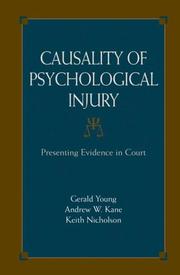
ISBN: 1280901403 9786610901401 0387364455 0387364358 1441942149 Year: 2007 Publisher: New York : Springer,
Abstract | Keywords | Export | Availability | Bookmark
 Loading...
Loading...Choose an application
- Reference Manager
- EndNote
- RefWorks (Direct export to RefWorks)
This sequel to the authors’ Psychological Knowledge in Court offers a welcome expansion on key concepts, terms, and issues in causality, bringing much needed clarity to psychological injury assessments and the legal contexts that employ them. Focusing on PTSD, traumatic brain injury, and chronic pain (and grounding readers in salient U.S. and Canadian case law), Causality sets out a multifactorial causality framework to facilitate admissibility of psychological evidence in court. Issues concerning malingering are examined in depth, as are clinical gray areas that can jeopardize validity. At the same time, the book clearly explains what lawyers and clinicians need to understand about each other’s work—of crucial importance since the two sides often seem to speak at cross-purposes. The authors and six guest contributors Illustrate the roles of preexisting vulnerabilities, traumatic events, and post-event occurrences in psychological impairment and disability Review the literature on PTSD, TBI, and chronic pain for legal relevance Identify current challenges and controversies in the field, as well as emerging areas for research Recommend methods and instruments for conducting more courtworthy assessments Provide a detailed critical review of malingering and related phenomena Propose a more accurate, shared terminology of causality Valid causality judgments are based on sound knowledge of research on large populations and careful testing of individuals; at the same time they must conform to stringent legal standards of relevance and reliability to be accepted for testimony. Forensic practitioners and attorneys will turn to Causality of Psychological Injury as their professional paths increasingly cross in seeking comprehensive and state of the art information.
Forensic psychology. --- Evidence, Expert. --- Liability for emotional distress. --- Expert evidence --- Expert testimony --- Expert witness --- Expert witnesses --- Opinion evidence --- Scientific evidence (Law) --- Evidence (Law) --- Witnesses --- Juridical psychology --- Juristic psychology --- Legal psychology --- Psychology, Forensic --- Forensic sciences --- Psychology, Applied --- Emotional distress, Liability for --- Liability for emotional distress --- Liability for mental anguish --- Liability for mental injuries --- Liability for nervous shock injuries --- Liability for psychiatric injuries --- Liability for psychic injuries --- Liability for psychic trauma --- Liability for psychological injuries --- Mental anguish, Liability for --- Mental injuries, Liability for --- Nervous shock injuries, Liability for --- Psychiatric injuries, Liability for --- Psychic injuries, Liability for --- Psychic trauma, Liability for --- Psychological injuries, Liability for --- Personal injuries --- Law and legislation --- Law --- Psychology, clinical. --- Law. --- Criminology. --- Law and Psychology. --- Clinical Psychology. --- Law, general. --- Criminology and Criminal Justice, general. --- Psychological aspects. --- Clinical psychology. --- Crime --- Social sciences --- Criminals --- Acts, Legislative --- Enactments, Legislative --- Laws (Statutes) --- Legislative acts --- Legislative enactments --- Jurisprudence --- Legislation --- Psychology, Juridical --- Psychology, Juristic --- Psychology, Legal --- Therapeutic jurisprudence --- Psychiatry --- Psychological tests --- Study and teaching --- Psychology --- Psychology. --- Behavioral sciences --- Mental philosophy --- Mind --- Science, Mental --- Human biology --- Philosophy --- Soul --- Mental health
Book
ISBN: 9780387252278 Year: 2005 Publisher: Boston, MA Springer Science+Business Media, Inc.
Abstract | Keywords | Export | Availability | Bookmark
 Loading...
Loading...Choose an application
- Reference Manager
- EndNote
- RefWorks (Direct export to RefWorks)
Forensic psychologists and psychiatrists are increasingly asked to provide expertise to courts and attorneys in the criminal justice system. To do so effectively, they must stay abreast of important advances in the understanding of legal standards as well as new developments in sophisticated measures and the methods for their assessment. Fundamentals of Forensic Practice is designed to address the critical issues that are faced by mental health experts in their role of conducting assessments, presenting findings, and preparing for challenges to admissibility and credibility. Uniquely practical and comprehensive, this volume operationalizes legal standards and describes empirically validated methods for their evaluation. Not only is this essential for mental health professionals, but it is equally valuable to criminal attorneys. Lawyers require both clinical knowledge and understanding of legal standards in order to prepare their own experts and to challenge those on the opposing side. For both clinical and legal experts Fundamentals of Forensic Practice offers a full view of all phases of criminal proceedings: - Pretrial diversion, determinations of bail, waivers of Miranda rights, and the capacity to consent to searches. - Trial competency to stand trial and criminal responsibility. Beyond insanity, the latter addresses mens rea, automatism, and psychological context evidence, such as battered-woman syndrome. - Post-trial sentencing, capital sentencing, competency to be executed, and other post-conviction issues. Other key features include: - Chapters on specific criminal issues in a consistent format, with comprehensive coverage of legal standards and relevant clinical methods - Guidelines for conducting more effective forensic evaluations - In-depth coverage of specialized assessments, eg. malingering, sexual predator cases, and the insanity defense. - A detailed overview of direct and cross-examination strategies This book is the second collaboration between Rogers and Shuman. As individual authors, each received the American Psychiatric Association's prestigious Guttmacher Award for their outstanding contributions to forensic psychiatry.
Psychology and law --- psychologie --- recht --- GGZ (geestelijke gezondheidszorg)
| Listing 1 - 10 of 13 | << page >> |
Sort by
|

 Search
Search Feedback
Feedback About UniCat
About UniCat  Help
Help News
News